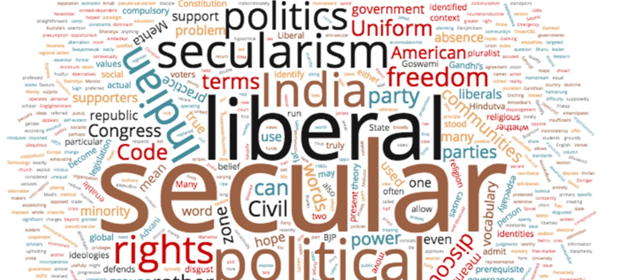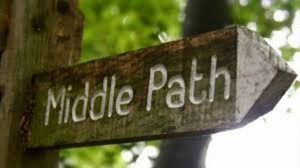EXCAVATING THE BEST MEANINGS

We have seen how the excavation of meanings through etymology, the historical origin of words, can help us explore the conceptual landscape, and it is worth noting that in a language like English, which has a mainly dual linguistic heritage – Germanic and Latin (through Norman French) – there may be important differences between words which may be used interchangeably but which actually have quite different underlying connotations depending on their original meanings. A suggestive example is the difference between “freedom” and “liberty.” The former is an Anglo-Saxon word, rooted in the Teutonic frei (cognate with the Sanskrit priya) meaning “to hold dear.” It goes back to the Indo-European root pri-, “to love” or prai, meaning “beloved,” hence “precious,” and also “at peace with.” The name Godfrey means “peace of God.” Norse Freya or Frija is the Goddess of love. “Freedom” is also a sister-word to “friend,” whose source (Old English freond) meant more than “friend” – also “lover.” This sense still survives in the way the Sufis refer to the Divine Beloved as “The Friend.” The original meaning of “free” was a term of affection uniting the members of a family in a common bond, but explicitly excluding their servants or slaves (those who were not “free’). Later, the meaning shifted from “affection” to “freedom.”
“Liberty” is a French word, inherited from the Romans. Although its original Indo-European root leudh, still intact in ancient Greek eleutheros “free,” may have denoted the sense of “being a member of a free people” as opposed to “being a slave,” its Latin root, liber, means to do what you want to do, to “do your own thing.” The same root gives us libertarian (and libertarianism), libertine (a rake or debauchee), libido, an urge, libidinous, given to indulging one’s urges, and (borrowed from the Greek) libation, an outpouring. For arch-conservatives, even the word liberal can carry the connotation of licentiousness and lawlessness, as well as the disparaging sense of “bleeding-heart liberal,” although its earlier sense in English was “generous” and “appropriate to the cultural pursuits of a free man,” as in the “liberal arts” or a “liberal education.” These connotations have survived to some extent in modern usage, and the term “liberal democracy” still holds a generally positive connotation across a broad spectrum of political persuasions. While there is, in the case of the word “liberty,” a continuum of connotations ranging from generosity, breadth of education and cultural enrichment through to the self-indulgent individualism of “doing whatever you like,” it can be argued, as Bert Hornback does, that a basic conceptual contrast between “freedom” and “liberty” is still retrievable. “Freedom,” he says, might be defined essentially as a social word and “liberty” as a selfish, anti-social, irresponsible word. Thomas Jefferson was emphatic about the responsibility which came with liberty, the “price” of which, he said, is “eternal vigilance” and he would no doubt have questioned John Stuart Mill’s assertion that “liberty consists in doing whatever one desires,” an opinion which Hegel was to dismiss as one of utter immaturity of thought.
It has to be said at this point that it would of course be impossible and undesirable to expect a categorical distinction between “freedom” and “liberty” to be embraced in public discourse, for language use develops organically over time and cannot effectively be controlled by decree or legislation, as we know from the largely impotent efforts of the Academie Française to stem the flow of borrowings from English into French. I have explored the varied connotations of “freedom” and “liberty” in some detail because this case is doubly instructive. It illustrates the conceptual richness which emerges from the understanding that English does not have a monolingual heritage, but is itself the product of a polylogue. It also illustrates the important principle of the continuum of meanings, and, within that, the positive and negative meanings we need to navigate. Rather than set up a quibbling and judgmental dichotomy between “freedom” and “liberty,” it is far more useful to focus on the underlying concepts, so that whichever word we use, we are investing it with the best and most beneficent of the senses derived from the range of meanings associated with both words. Thus, in using the word “freedom” or “liberty,” we would be referring to a composite sense which balances a recognition of both the needs of the individual and the importance of communal responsibility. After all, just as the over-valuation of individual needs can lead to selfish individualism, so the over-valuation of shared social bonds can lead to tribalism and communitarianism. We should not idealize the social dimension of “freedom” any more than we should idealize the individual dimension of “liberty.” Such considerations have pressing contemporary relevance, as in the ongoing debate over “freedom of speech” and what this means in a “liberal democracy.”
This article is an excerpt from: Ziauddin Sardar & Jeremy Henzell-Thomas, Rethinking Reform in Higher Education (London/Washington: IIIT, 2017), pp. 195-7.
The views expressed in this article are those of the author and do not necessarily reflect the views of the International Institute of Islamic Thought (IIIT).




